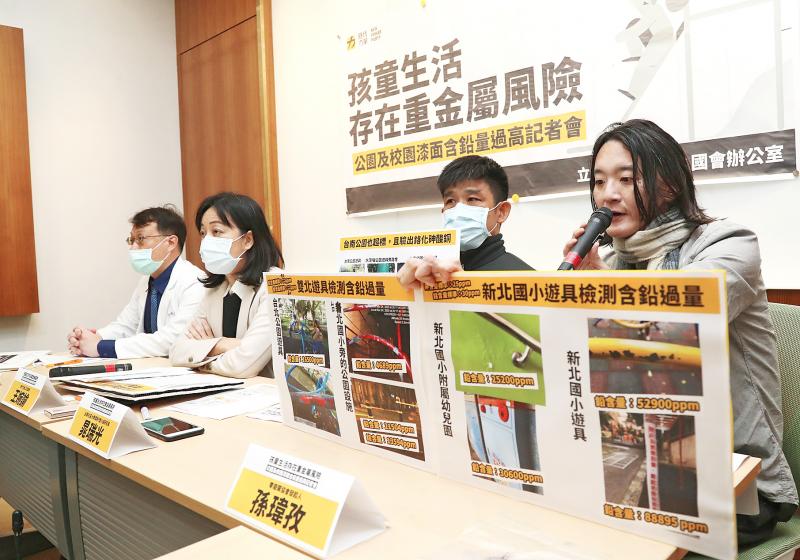After a survey found excessive levels of lead in playground equipment, advocates yesterday called for increased government regulation, as well as public awareness, of potential lead exposure from painted surfaces.
While public discussion about the dangers of heavy metals has often been focused on food safety, attention has seldom been drawn to the risks of heavy metals in playground equipment, New Power Party Legislator Claire Wang (王婉諭) told a news conference in Taipei.
Taiwan Zero Waste Alliance founder Sun Wei-tzu (孫瑋孜) said that a survey he conducted with researchers at Tainan Community University found that the levels of lead in the paint on playground equipment in some parks and schools in Taipei and New Taipei City were significantly higher than the maximum 90 parts per million stipulated in the National Standards of the Republic of China.

Photo: CNA
Chao Jui-kuang (晁瑞光), a researcher who is part of the university’s environmental action team, said that in Tainan, the survey found that while newer playground facilities generally met national standards, the paint on other equipment that might not be designed for children to play with, but was installed near play areas, such as street lamps, contained high levels of heavy metals that exceeded permissible limits.
The paint was peeling on many parts of the equipment and was within children’s reach, he said.
Regulations for the management of the safety of children’s playground facilities stipulate that monthly inspections should be performed using a checklist developed by the government, Wang said.
However, the checklist mainly includes items related to the outward appearance and functionality of the equipment, including whether the paint is cracking or flaking, she said, adding that it does not include items related to heavy metal content in paint.
Besides playground equipment, some of the other facilities at school campuses, such as fire safety equipment, might be coated with paint but are regulated by regular standards for architectural features instead of standards designed specifically for children, she said.
Considering children have a lower tolerance than adults regarding exposure to heavy metals, all paint used on school campuses should be held to stricter standards, she said.
“The impact of lead poisoning on children is almost irreversible,” said Lee Jung (李嶸), director of the pediatric emergency department at Linkou Chang Gung Memorial Hospital in Taoyuan.
Children absorb three to five times as much lead as adults when exposed to the same environment, he said.
At the same time, because preschool children’s kidneys do not function very well, their bodies cannot get rid of lead as well as adults’ bodies, he said.
Food, clothing, shelter and transportation are all areas where steps can be taken to prevent children from being exposed to lead, he said.
To minimize exposure to lead, children can wash their hands with soap after touching playground equipment with chipped paint, people should avoid giving them toys with unclear labeling or of unknown origin, and pieces of paint that have fallen off the walls of old residential buildings should be cleaned, as older paint is more likely to contain lead, he said.
Wang and the other attendees at the news conference proposed stepping up safety checks of the paint on playground equipment and making the results publicly available, as well as imposing stricter standards for painted surfaces in places frequented by children.

The manufacture of the remaining 28 M1A2T Abrams tanks Taiwan purchased from the US has recently been completed, and they are expected to be delivered within the next one to two months, a source said yesterday. The Ministry of National Defense is arranging cargo ships to transport the tanks to Taiwan as soon as possible, said the source, who is familiar with the matter. The estimated arrival time ranges from late this month to early next month, the source said. The 28 Abrams tanks make up the third and final batch of a total of 108 tanks, valued at about NT$40.5 billion

Two Taiwanese prosecutors were questioned by Chinese security personnel at their hotel during a trip to China’s Henan Province this month, the Mainland Affairs Council (MAC) said yesterday. The officers had personal information on the prosecutors, including “when they were assigned to their posts, their work locations and job titles,” MAC Deputy Minister and spokesman Liang Wen-chieh (梁文傑) said. On top of asking about their agencies and positions, the officers also questioned the prosecutors about the Cross-Strait Joint Crime-Fighting and Judicial Mutual Assistance Agreement, a pact that serves as the framework for Taiwan-China cooperation on combating crime and providing judicial assistance, Liang

A group from the Taiwanese Designers in Australia association yesterday represented Taiwan at the Midsumma Pride March in Melbourne. The march, held in the St. Kilda suburb, is the city’s largest LGBTQIA+ parade and the flagship event of the annual Midsumma Festival. It attracted more than 45,000 spectators who supported the 400 groups and 10,000 marchers that participated this year, the association said. Taiwanese Designers said they organized a team to march for Taiwan this year, joining politicians, government agencies, professionals and community organizations in showing support for LGBTQIA+ people and diverse communities. As the first country in Asia to legalize same-sex

MOTIVES QUESTIONED The PLA considers Xi’s policies toward Taiwan to be driven by personal considerations rather than military assessment, the Epoch Times reports Chinese President Xi Jinping’s (習近平) latest purge of the Chinese People’s Liberation Army (PLA) leadership might have been prompted by the military’s opposition to plans of invading Taiwan, the Epoch Times said. The Chinese military opposes waging war against Taiwan by a large consensus, putting it at odds with Xi’s vision, the Falun Gong-affiliated daily said in a report on Thursday, citing anonymous sources with insight into the PLA’s inner workings. The opposition is not the opinion of a few generals, but a widely shared view among the PLA cadre, the Epoch Times cited them as saying. “Chinese forces know full well that